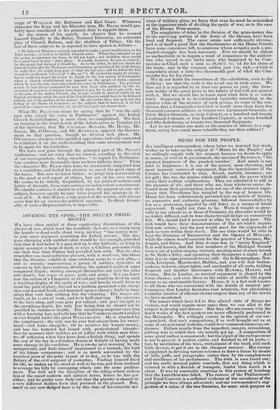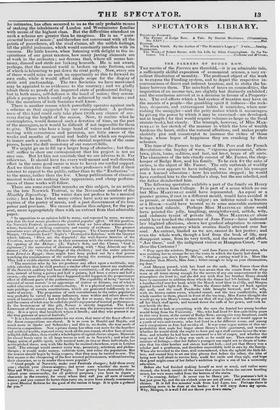MUSIC FOR THE PEOPLE.
AN intelligent correspondent, whose letter we inserted last week, wishes us to take up the subject of " Music for the People ;" and we willingly comply with his request, because we desire to apply to music, as well as to government, the maxim of BENTHAM, " the greatest happiness of the greatest number." And music is one inlet to happiness : it is one of the purest, most elevating, and most innocent sources of enjoyment, that the benevolence of the Creator has vouchsafed to man. Sound, melody, harmony, are his gift; his, too, the genius which unfolds and the power which varies their endless combinations. They are calculated to add to the pleasure of all; and those who are, from whatever cause, de- barred from their participation, taste not one of the sweetest ingre- dients that Providence has mingled in the cup of human life. Music has been unfortunately perverted into an article of luxury, an expensive and exclusive pleasure; followed (successfully) by few as a profession, regarded by still fewer as a means of social enjoyment. It ought not thus to be. Were it taught as gene- rally in our schools as in those of Germany, its pleasures would be as widely diffused, and its true character and design as extensively felt. We should find it resorted to alike by rich and poor. The rich would have those demonstrations of the art which require first-rate artists ; and the poor would meet for the enjoyment of such as were within their reach. The one class would be able to
hear the Sinfonias of BEETHOVEN and the Operas of MOZART; while the others would associate for the practice of Choruses, Ma- drigals, and Glees. And thus it once was in "merry England." It is well known, that the first members of the Madrigal Society were a set of psalm-singing weavers, meeting atan obscure tavern in St. Bride's Alley, and spending their threepence a night. And thus it is in some provincial towns still. Go to Birmingham, Nor- wich, Liverpool, Manchester, Halifax, and you will find button- makers, weavers, shipwrights, and mechanics of all sorts, holding frequent and familiar intercourse with HANDEL, HAYDN, and SPOHR. But in London, no musical enjoyment is shared by the lower classes; and even those in the ranks of middle life regard music as an unattainable luxury. Hence, it is a fact well known to all those who are conversant with the details of musical per- formances, that London furnishes (not relatively, but absolutely) a smaller number of efficient chorus-singers than any of the towns we have mentioned.
The causes which have led to this altered state of things are various, and would require more space than we can allot to the subject to develop and discuss. But they offer one reason why the finest works of the best masters are never efficiently performed in the Metropolis. We willingly concur in the opinion of our cor- respondent, that such compositions, if as well brought out as at sonic of our provincial festivals, would here command numerous au- diences. Failure results from the imperfect, meagre, scrambling, jobbing way in which they are usually got up. A composition of some great author is announced ; but the object of the entrepreneur is not to present it perfect, entire, and finished in all its parts,— but, by mutilation of the work, curtailment of the band, and such little devices, to get it out in the cheapest manner. His energy is employed in devising various schemes to draw a house by means of bills, puffs, and paragraphs, rather than by the completeness and excellence of his performance. The trick is soon found out; and the really musical public conclude, that any thing which is ushered in with a flourish of trumpets, louder than usual, is a cheat. It was by constantly resorting to this system Of humbug that the Lent Oratorios failed. The success of the Philharmonic and Vocal Concerts is a sufficient evidence of the soundness of the principle we have always advocated; and our correspondent's sug- gestion of a union of the two Societies, for some such purpose as
he intimates, has often occurred to us as the only probable means of making the inhabitants of London and Westminster familiar with music of the highest class. But the difficulties attendant on such a scheme are greater than be imagines. He is an " unin- structed lover of music ;" and therefore not conversant with all the points of precedence, all the rival claims, all the selfish feelings, all the pitiful jealousies, which would constantly interfere with its success. He little knows, when listening with delight to the in- spirations of our great masters, how many jarring elements are at work in the orchestra ; nor dreams that, where all seems har- mony, discord and strife are lurking beneath. He is not aware, perhaps, that the musical world is broken up into factions, each of which is labouring to put down its rival party. Now, every one of these would seize on such an opportunity as this to forward its own ends, while it would afford ample scope for the display of strife and partisanship. The two Societies we have mentioned may be appealed to as evidences to the contrary; and we gladly admit them as proofs of an improved state of professional feeling : but in both cases, self-defence is the bond of union; they accom- plish a purpose which could only be achieved by such means ; and this the members of both Societies well know.
There is another reason which powerfully operates against such a scheme as that suggested by our correspondent. A perform- ance of this kind could only take place (with any chance of suc- cess) during the height of the season. Now, to realize what he contemplates, would demand such a devotion of time, on the part of the managers, as it would be difficult if not impossible for them to give. Those who hear a large band of voices and instruments moving with correctness and precision, are little aware of the weeks and months of mental and bodily toil which are requisite to insure such a result. Hence the eternal repetition of the same pieces, hence the dull monotony of our concert-bills.
We might go on to fill up a larger heap of obstacles ; but these will suffice to show our correspondent that his project is not an easy one. But let him not conclude that we are adverse to it. Far otherwise. It should have (as every well-meant and well-directed effort in the same good cause is sure to have) our cordial sapport. And we think the time will come when professors will find it their interest to appeal to the public, rather than to the" Exclusives "— to the many, rather than the few. Cheap publications of classical musical works are making their appearance, and cheap perform- ances of those works will follow.
There are some excellent remarks on this subject, in an article on the late Norwich Festival, in the November number of the Monthly Repository. The writer does not profess to be a musical critic ; but he has (what many critics have not) an accurate per- ception of the poetry of music, and a just discernment of its true power and province. We cannot dismiss this subject, for the pre- sent, more appropriately than m ith an extract from that admirable paper.
" In opposition to an opinion held by many, and repeated by more, we main- tain that the best music produces the greatest popular effect. Of this position, the Norwich Festival, in accordance with what we have often witnessed else- where, furnished a striking continuity and variety of evidence. The greatest sensations were all produced by the finest passages. The Chorus and Fugue from Mozart, 0 heavenly Lord !' Sophr's ' Destroyed is Babylon,' with the Quartet which follows, Blest are the departed ;' the well-known beauties of the Creation, never so efficient as in their connexion with the entire composition ; the opening of the Deluge ; (E. Taylor's Solo, and the Chorus God is righteous ;') the succession of choruses ending with Sing Jehovah our Re- deemer;' the air 'On the dwellings of thy children ;' and the entire selection from Israel in Egypt; these might have been picked out by a deaf person watching the countenances of the auditory during the morning performances. They had a visible electric action on the assembly. " The musician who by his art produces any effect upon a multitude, may safely calculate that he shall produce a similar effect upon almost any multitude. If the Nurwich auditory had been differently constituted,—if the price of admis- sion, instead of being a guinea and half a guinea, had been a crown and half a crown,—the same thing would have happened as did happen in the proportionate effect of different parts of the performance. The capability of being moved by concord of sweet sounds' is no appendage of station or fortune, nor of what is called education, nor even of intellectuality. It is a physical and connate or in- nate privilege of certain constitutions, which are generated indifferently in a!I ranks of society. The proportion of such constitutions to the entire population may probably be varied by many influences, some within and others above the reach of human control ; but whether they be few or many, they are the centre and the source of what may be called the public enjoyment of musical performances. In the bestowment of this gift, Nature is strictly. impartial. The Lord. Lieutenant of the county may have it, and so may the journeyman weaver of the city. It is a spirit that breathed' where it listeth; and they who possess it arc the true patrons of musical festivals." " It is a favourable circumstance for our view, that most of the finest effects of the finest compositions are choral. It is so even in Handel and Haydn, and much more in Spoilt- and Schneider ; and this is, no doubt, the true mode of Oratorio composition. Now a prima donna has often cost more for the heartless and artificial INGIble, repeated every week all the year round, of a few bars of unin- telligible difficulties, than would a whole legion ot capital chorus-singers. Materials for choral bands exist in all large towns as well as in Norwich ; and what the happy union of public spirit, with musical taste, in two or three individuals, has accomplished there, may with like facility be realized elsewhere, even in London itself. The attempt would answer every way, pecuniary, artistical, and philan- thropic; it would make money, cultivate taste, and refine the population. But the sowers should begin by being reapers, that they may be incited to sow. The first means is the cheapening of the best musical performances, withoutlowering their character, so as to render them more popular." "Good people of Norwich, make your Festivals cheaper ; hold them every year ; cherish your chorus-aiugers; and never care whether' the music be Blue and White, or Orange and Purple. Your gentry have abominably demo- ralized your commonalty, fur all political purposes : you have to regain a character in the country, for every where they call you all sorts of rascally names ; and you cannot do better than carry on, as you have already commenced, a great Musical Reform for the good of the nation at large. It is quite a godsend far you."























 Previous page
Previous page